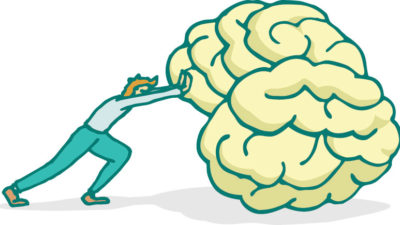For gifted students, “smart” can mean all kinds of interesting things:
- “I already understand that.”
- “I learned that last year” (or two or three or more years ago).
- “I can do this without trying.”
- “I don’t have to work hard.”
- “Everything is easy.”
“Smart” can actually be crippling because when things get hard—and things get hard for everyone, eventually—then everything isn’t easy anymore. They don’t understand right away. They have to work hard and try. And they don’t know how.
I went to college with friends who had been valedictorians at their high schools. They had cruised through high school, never putting any effort in, acing all their classes.
They arrived at our college, which consistently gets rated one of the top 100 small colleges in the US. Suddenly they were struggling to make Cs. They didn’t know how to study for tests. They didn’t know how to take notes. They didn’t know how to do the work of being students.
I had it a lot easier. I had come from a very difficult high school with very high expectations.
Our college was harder for me than my high school, but I expected to work harder at college than at high school. I put in more time, doing what I had been trained to do. My GPA went down too, but only a tenth of a point. My public school district back home had prepared me for difficult work.
I tell my students that story. I tell them everybody “hits the wall” at some point—they reach the point where learning new things isn’t easy anymore.
It’s a whole lot easier to hit the wall in elementary school than in college!
In elementary school you have teachers and parents who spend all kinds of time meeting with you and helping you and supporting you. We—teachers and parents—work together to teach you and train you and coach you into learning how to tackle the difficult task of thinking hard as you learn new and challenging material.
Be grateful for the adults who are willing to help! And be gracious about accepting their help!
Then I talk to my students about perfectionism. So many of my students are tied up in knots with perfectionist issues. I tell them right up front, “You can’t be perfect in my room. I won’t let you.”
They look at me as if I’ve lost my mind.
“If you can consistently get 100% on your work, chances are you are not in the right placement. You need to be moved up a grade in math. Or you need to be reading more challenging books. Or I need to be holding you to a higher standard on the writing continuum.”
Sometimes a student will ask what that would look like.
“I’ve had students now and then who are so exceptional at writing that they get 4s across the board on nearly everything they write. At that point I sit them down and tell them, ‘Now I’m going to start talking with you the way I would talk with an adult writer in an adult writers group.’ They look a little startled for a minute but take a deep breath and jump right in. There’s always room for improvement.
“If you meet the bar, I will raise it.”
It’s not about being perfect, it’s about pursuing excellence. It’s about getting better. It’s about stretching our abilities. It’s about growth.
Nearly every year after conferences I end up—like last week—having lunch with a student and a parent. We talk about perfectionism and anxiety and staying awake at night not being able to sleep. Sometimes the parent realizes they have the same issues their child does! Sometimes I just need to reiterate that, yes, this is a hard class. And if the child gets confused or frustrated, they can call me at home in the evening. I would rather have them get help and be able to sleep.
So it’s not about being perfect. In fact, it’s not even about “doing your best” all the time. I have to be careful with that misconception, and I have careful conversations with parents about that at conferences. Frankly, I don’t think it’s possible for anyone to “do their best” in every subject at all times, especially with all the other things my students are involved in. I have students who do two or even more extracurricular events at a time—dance, drama, sports, foreign languages, singing, musical instruments, caring for animals, caring for siblings. Sometimes it’s enough to say, “Do well.”
Not necessarily, “do your best,” but definitely “do well.” The goal is improvement. What can you do to get better?

I tell my students that every student in the school has to work hard. They should too.
Me too. I tell them I should be working hard to improve right alongside them.
For a lot of gifted students, they really hit “the wall” for the first time in higher math courses. With algebra. Or geometry. Or maybe calculus.
The better I can equip my students with the ability to think hard, to work hard, to pursue excellence—to want to grow—the better they will be able to scale any wall that life throws at them.
My new motto in my class is “poco a poco,” Spanish for “little by little.” I’ve been using this motto with students who struggle with academics and with behavior, encouraging them to take one tiny step forward that day. But your post remind me to use this same motto with more ready learners: what is the one step we can take today to move further and deeper in our thinking, our work, our leadership?
Jan,
I love this post. I say some of the same things to my students. I will, if you don’t mind, adopt a couple of the ones I don’t use. In particular, I like the way you talk about “doing your best.” With my students, showing up and staying motivated is the best I can ask for some days. I tell them that I expect to share their struggles. They are learning, not proving that they know everything. If they were already perfect, I wouldn’t have a job!
Jan,
It can be such a challenge to find that sweet spot of being at the higher end of a child’s Zone of Proximal Development where you are challenging students to the point they must seek help to be successful and having them feel comfortable with the feeling. I love Carol Dweck’s research in Mindset that shows Highly Capable students often do not want to push themselves if they are mainly concerned with outcome, but enjoy pushing themselves if effort is what is celebrated. I tell my students, “I love when my brain hurts! That tells me it is growing!” I also tell them that their need for help keeps me employed! They like that one!
Jan,
Thank you for sharing your insight that it is not about “doing your best” all the time, and that it’s not even possible to do so. The words we use really make a difference. “Do well,” is a sentence I will add to my repertoire. I agree that striving for excellence and growth are what we are after.
Thank you for this piece. We just finished conferences with a wide range of reactions to the “not so perfect” letter grade.
Jan,
Thank you for this post. I appreciate the larger issues you are writing up against and indicating in the links within your post, that learning, all learning, is a process. It is messy, often individual, and continual. Perfectionism usually swallows up the notion of, or value of the process because it focuses on product. Education, learning, cannot be a series of products. It is about engagement, observation, and–as you write–development/improvement.
I run into this all the time teaching AP English courses. Students come into my classroom–usually the juniors in AP Language–feeling like they know how to write well. Many of them do write well, but writing always, always leaves room for improvement. I find most of my year is spent teaching them to look closely at their language–sentence by sentence sometimes–, which will lead to them looking closely at their thinking. The key, I’ve found, is to do this both when generating material, and when reflecting on material. This way students get to see the spectrum of thought and of development, and they start building the skills and grit necessary (I hope) to break through any walls they run up against.
I taught my fourth graders to play chess during the last 25 years of my career, so that everyone would have the chance to stretch themselves as far as they could, and find that sometimes one tries very hard and still comes up short, but finds that life will go on. It was a great way to help the perfectionist child shed a fear of coming up short. It also was a great way to present all students with a subject requiring the deepest of thought, and the most careful of reading when studying various chess books. I could model being a learner, and being an imperfect player during our studies. Chess also gave many students a dose of legitimate confidence when they realized they had learned something very complex, and had become fairly good at it. When I did my NBCT work I also demonstrated that chess improved children’s reading and math levels.